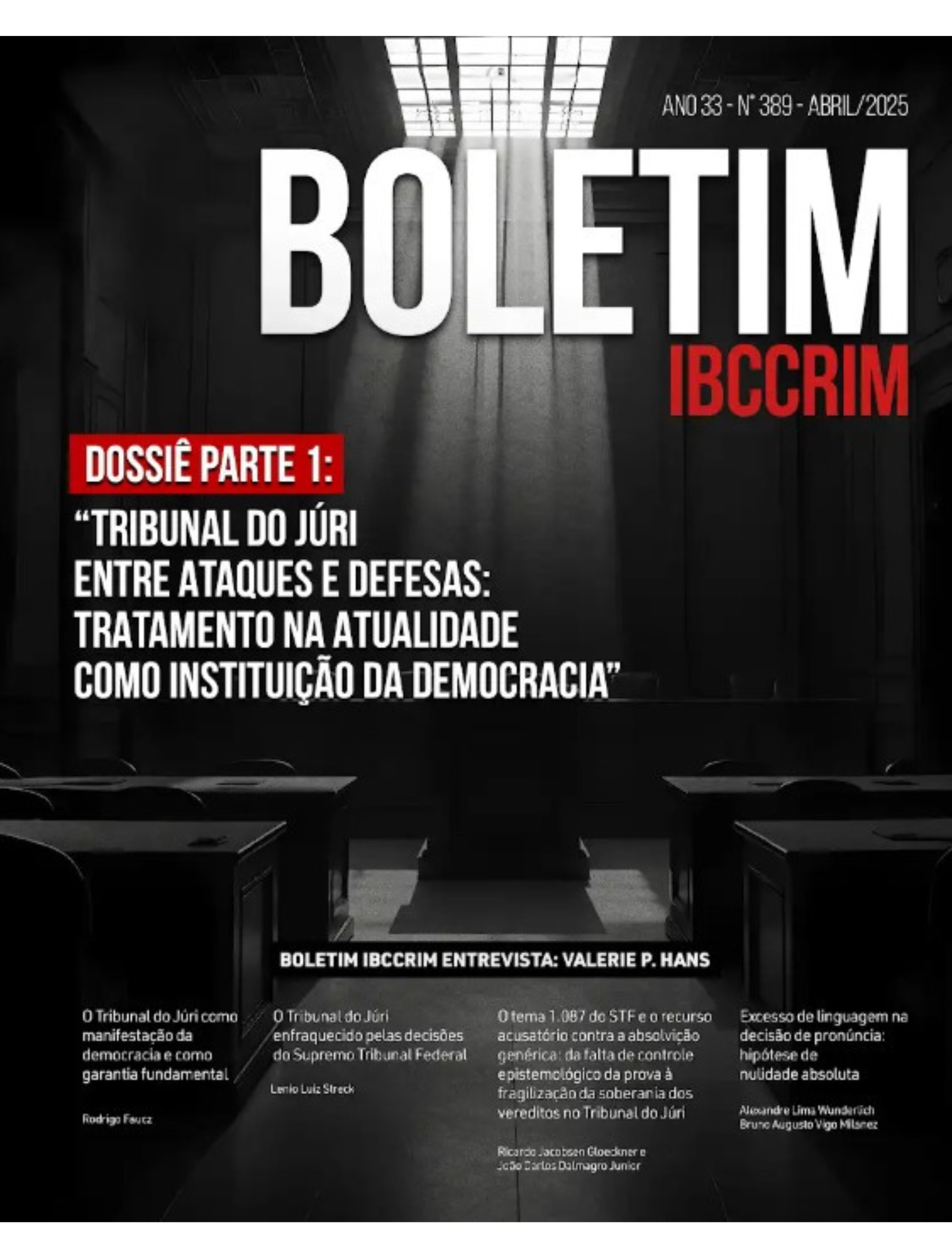O Tribunal do Júri enfraquecido pelas decisões do Supremo Tribunal Federal
Vistas: 183DOI:
https://doi.org/10.5281/zenodo.14991084Palabras clave:
Direitos Fundamentais, Presunção de Inocência, Hermenêutica JurídicaResumen
Em análise à jurisprudência mais recente do Supremo Tribunal Federal sobre o Tribunal do Júri, partindo de uma visão qualitativa, é perceptível que há uma relativização de determinadas normas constitucionais e de direitos individuais. A partir dessa análise, é possível indagar o seguinte: De que modo uma garantia pode ser analisada contra o réu? O presente artigo analisa as implicações da decisão do Supremo Tribunal Federal sobre a execução imediata da pena nas condenações do Tribunal do Júri, estabelecida pelo "Pacote Anticrime" (Lei nº 13.964/2019) e modificada pelo STF no Recurso Extraordinário nº 1.235.340. A decisão, que permitiu a execução imediata de qualquer condenação do Júri, independentemente da pena, rompe com o princípio da presunção de inocência, contradizendo precedentes anteriores da Corte.
Descargas
Publication Facts
Reviewer profiles N/D
Author statements
- Academic society
- Instituto Brasileiro de Ciências Criminais
- Editora:
- IBCCRIM
Citas
Alexy, Robert. Teoria da argumentação jurídica: a teoria do discurso racional como teoria da fundamentação jurídica. 2. ed. São Paulo: Landy, 2005.
Brasil. Supremo Tribunal Federal. Recurso Extraordinário 1.235.340 Santa Catarina. Relator: Ministro Luís Roberto Barroso. Julgado em 12 set 2024.
Brasil. Supremo Tribunal Federal. Recurso Extraordinário com Agravo 1.225.185 Minas Gerais. Plenário. Relator: Ministro Gilmar Mendes. Julgado em 03 out 2024.
Heck, Philip. Interpretação da lei e jurisprudência dos interesses. Tradução de José Osório. São Paulo: Saraiva, 1947.
Streck, Lenio Luiz: O STF, a prisão no júri e o voto equivocado de Barroso. Revista Eletrônica Consultor Jurídico. Disponível em: <https://www.conjur.com.br/2023-jul-03/lenio-streck-stf-prisao-juri-voto-equivocado-ministro-barroso/>.
Descargas
Publicado
Cómo citar
Número
Sección
Licencia
Derechos de autor 2025 Lenio Luiz Streck

Esta obra está bajo una licencia internacional Creative Commons Atribución-NoComercial 4.0.
Los derechos de autor de los artículos publicados pertenecen al autor, pero con los derechos de la revista sobre la primera publicación y respetando el periodo de exclusividad de un año. Los autores sólo podrán utilizar los mismos resultados en otras publicaciones indicando claramente esta revista como medio de la publicación original. Si no existe tal indicación, se considerará una situación de autoplagio.
Por tanto, la reproducción, total o parcial, de los artículos aquí publicados queda sujeta a la mención expresa del origen de su publicación en esta revista, citando el volumen y número de la misma. A efectos legales, deberá consignarse la fuente de la publicación original, así como el enlace DOI de referencia cruzada (si lo hubiera).


 Português (Brasil)
Português (Brasil)
 English
English
 Español (España)
Español (España)












